
Socialistisk Biblioteks Tidslinje med links til begivenheder og personer i 1792.
Se også Index over personer, organisationer/partier og værker (som bøger, malerier, mm.), steder, begivenheder, mv., der er omtalt på hele Tidslinjen, titler og indhold på emnelisterne osv.
6. marts 1772
6. marts 1792 forbydes den transatlantiske slavehandel under dansk flag.
se: Den danske slavehandel, ca. 1660-1848 (Danmarkshistorien.dk).
Se også på Tidslinjen 3. juli 1848 om dansk slaveri.
25. april 1792
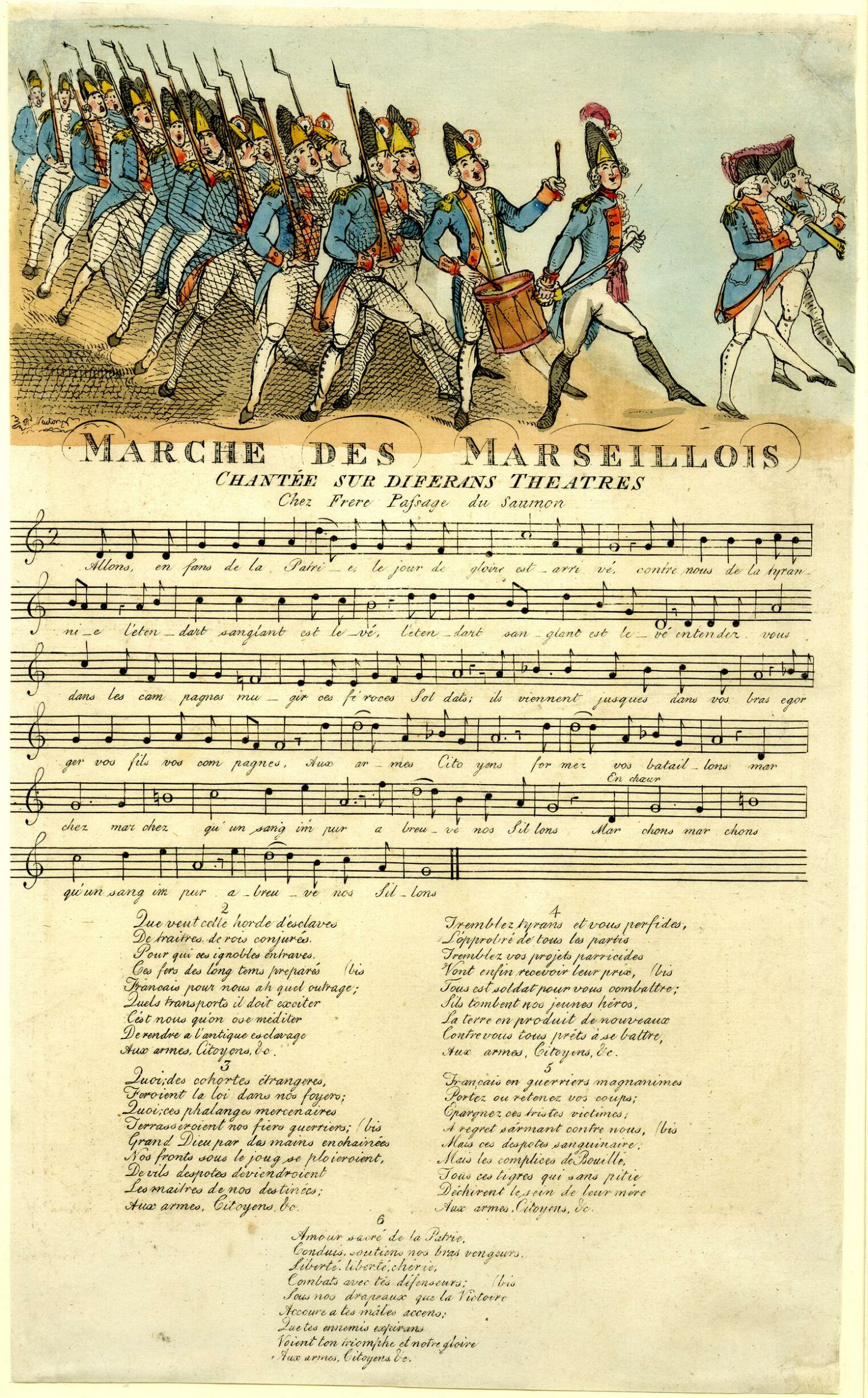
Natten til den 25. april 1792 skrev og komponerede Rouget de Lisle en “Kampsang for Rhin-Armeen” (Chant de guerre pour l’Armée du Rhin) i Strasbourg til forsvar for den unge revolutionære franske republik. Sangen blev republikkens kampsang i 1795, Marseillaisen, og fransk nationalsang.
Se:
- Marseillaisen (Wikipedia.dk). Leksikonartikel med links til større engelske og franske artikler om sangen, forfatteren mv. + danske oversættelser.
- Russia 1918-1922 (Nationalanthems.info.ru). Om brugen af sangen i Den Russiske Revolution.
Marseillaisen i Danmark og sangene i Napoleonstidens Danmark (Det Kongelige Bibliotek). Herunder:
- Harald Holms Marseillaise-gendigtning i Højskolesangbogen, hvor den blev præsenteret første gang i 5. udgave (1906) som et tillæg. Med links til danske tekst, 7 vers. 1. linje: “Frankrigs Sönner. Op nu at fæ-ægte”.
- Emil Wiinblad: Arbejder-Marseillaise, 1872. Med link til den danske tekst. 1. linje: “Op til Kamp!. Op I Arbejdersønner”.
P.A. Heibergs gendigtning (Kailliope.org). På dansk er ikke i samlingen fra Kongelige Bibliotek, på trods af, at dens indflydelse i samtiden er nævnt.
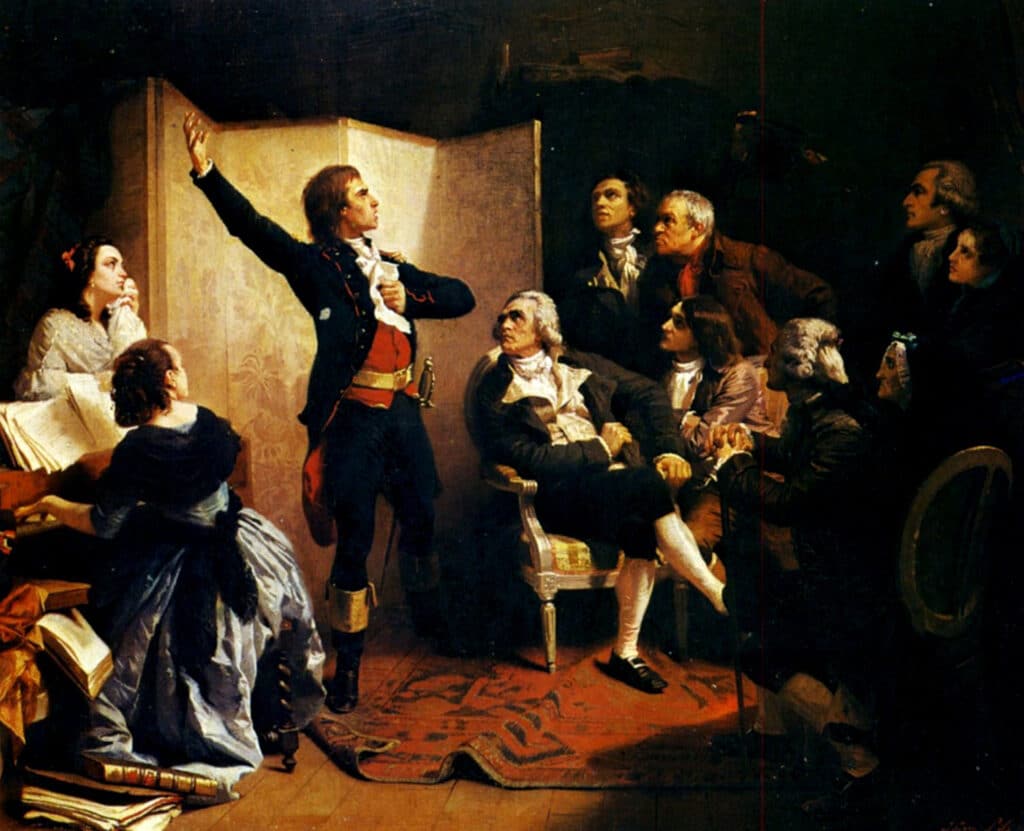
Se også:
Worker’s Marseillaise (Wikipedia.org). Med link til tyske udgave.
Se på Socialistisk Bibliotek:
- Tidslinjen: 14. juli 1789, om Den Franske Revolution.
- Linkboxen: Oplysningstiden/The Enlightenment
31. juli 1792
Grundstenen nedlægges til Frihedsstøtten (stod færdig i september 1797).
-
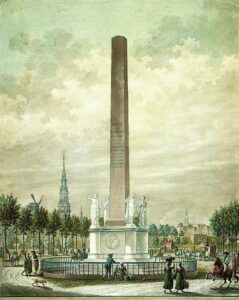
Frihedsstøtten i København, Denmark, circa 1800. Kunstner: Ukendt. Public Domain. Kilde: Wikimedia Commons. Frihedsstøtten (Assistens Kirkegård)
- Frihedsstøtten (Denstoredanske.dk)
- Frihedsstøtten (site). Afsnit om restaureringen, 1998-99.
Se også på Socialistisk Bibliotek
- Tidslinjen: 4. februar 1733, om Stavnsbåndet.
4. august 1792
Digteren Shelley fødes (dør 8. juli 1822)
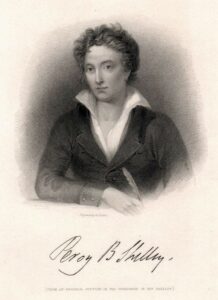
Links:
- Percy Bysshe Shelley (Marxists Internet Archive). Kort biografi.
- Percy Bysshe Shelley (Spartacus Educational)
- Percy Bysshe Shelley (Wikipedia.org)
Shelley’s revolutionary poetry. By Tess Lee Ack (Red Flag, 22 December 2022). “Percy Bysshe Shelley (1792-1822) was one of the major English Romantic poets—and arguably the greatest … But he was much more than that: he was also a passionate revolutionary.”
For Percy Bysshe Shelley, literature was the spark of the revolution. By Jared Marcel Pollen (Jacobin, September 10, 2022). “After the 1819 Peterloo Massacre, the young radical poet Percy Bysshe Shelley proclaimed he was deserting ‘the odorous gardens of literature’ for ‘the great sandy desert of politics’. Instead, he infused literature with revolutionary political ideas.”
Percy Bysshe Shelley belongs to us, the many. By Piper Winkler (Jacobin, August 20, 2022). “Following the 200th anniversary of his death, we look at the great Romantic who brought poetry to the class struggle.”
Long gone, but speaking clearly to our age – Shelley, the poet of moral and political corruption. By Kenan Malik (The Guardian, 10 July 2022). “Friday marked the bicentary of the great radical writer who wanted culture to spark the imaginations of ‘ordinary’ people.”
The Peterloo Massacre and Shelley. By Paul Bond (World Socialist Web Site, 1 October 2019). “The following is the concluding part of a two-part article focusing on the response to the massacre by the great poet Percy Bysshe Shelley.”
Percy Bysshe Shelley: Poet and Revolutionary. By Alex Snowdon (Counterfire, November 6, 2015). Review of Jacqueline Mulhallen’s book (Pluto Press, 2015, 170 p.). “This gem of a book recaptures Shelley’s world and demonstrates the revolutionary poet’s relevance for our own world.”
See also review by Matthew Cookson: The radicalism of Shelley (RS21, January 6, 2016) + extract from the book: A philosophical review of reform.
Rise like lions after slumber: revolutionary Shelley (Counterfire, 30 September 2012). “Percy Shelley was a radical poet, polemicist and political activist. Jacqueline Mulhallen traces the revolutionary thread that ran through this extraordinary writer’s life and work.”
The theatre of Shelley. By Katherine Connelly (Counterfire, 10 June 2011). Review of Jacqueline Mulhallen’s book (Open Books, 2010, 289 p.): “Mulhallen’s groundbreaking research redefines our view of Shelley as an artist and as a revolutionary, and is an important and inspiring contribution to understanding Shelley.”
Shelley’s plays still emit the light of freedom. By Jacqueline Mulhallen (Socialist Worker, Issue 2114, 16 August 2008). “Shelley is well-known for poetry that opposed oppression, but his plays also show his hatred of tyranny.”
Shelley: a socialist poet (World Socialist Movement, 13 August 2006). “Eventually I got my own copy of Shelley and, over many, many years, I have prized it as the first real socialist literature I ever read.”
Rise like lions? Shelley and the revolutionary left. By William Keach (International Socialism, Issue 75, Summer 1997, p.91-105). “The task of reclaiming Shelley’s poetry for the revolutionary left, most notably undertaken by Paul Foot in his book Red Shelley, inevitably raises difficulties and complications which I would like to address.”
Shelley: The trumpet of a prophecy. By Paul Foot (International Socialism, No.79, June 1975, p.26-32). “Shelley wanted the truth about repression and exploitation to go ringing through each heart and brain, so that each heart and brain would unite in action to end that repression and exploitation.”
Video: Shelly and revolution. By Paul Foot (SWP Recording; YouTube, 1:28:38 hour). Recorded speach.
Shelley and Socialism by Edward and Eleanor Marx-Aveling (To-Day, April 1888, p.103-116; online at Marxists Internet Archive)
Litteratur:
- Paul Foot: Red Shelley (Bookmarks, 2. ed., 1995, 288 p.). Se: Paul Foot – Red Shelley (ResoluteReader, November 9, 2005) + Red Shelley (Wikipedia.org)
Se også på Socialistisk Bibliotek:
- Tidslinjen 16. august 1819 om Peterloo-massakren i Manchester & Shelleys digt derom
- Linkboxen: Oplysningstiden/The Enlightenment
















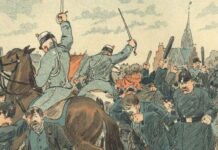
![Illustration to Robert Burns' poem Auld Lang Syne by J.M. Wright and Edward Scriven. The Complete Works of Robert Burns: Containing the Poems, Songs, and Correspondence. Illustrated By W.H. Bartlett, T. Allom, and Other Artists. With a New Life of the Poet, and Notices, Critical and Biographical[1] by Allan Cunningham. Published in London by George Virtue. No year is given explicitly, but "James Gibson 1856" has been handwritten inside the front cover, it's dedicated to a MP, Archibald Hastie of Paisley, who was no longer a MP by 1857, and some of the artists and engravers were dead before 1842. As such, I'm going with c. 1841 as the year, though it could be as late as 1856, when James Gibson evidently acquired. From: The Complete Works of Robert Burns: Containing the Poems, Songs, and Correspondence. Illustrated By W.H. Bartlett, T. Allom, and Other Artists. With a New Life of the Poet, and Notices, Critical and Biographical by Allan Cunningham, London: George Virtue. Drawn by John Masey Wright (1777–1866, artist), Engraved by John Rogers (c. 1808-c. 1888, engraver), Restored by Adam Cuerden (1979–, restorationist), Cropped by Beyond My Ken. Public Domain.](https://socbib.dk/wp-content/uploads/2018/02/John_Masey_Wright_-_John_Rogers_-_Robert_Burns_-_Auld_Lang_Syne_crop-218x150.jpg)
![A demonstration of workers from the Putilov plant in Petrograd (modern day St. Peterburg), Russia, during the February Revolution. The left banner reads (misspelt) "Feed [plural imperative] the children of the defenders of the motherland"; the right banner, "Increase payments to the soldiers' families - defenders of freedom and world peace". Both refer to the economic toll the First World War was having on civilian life, February 1917 (probably around March 7 [O.S. February 22]) Photo: Unknown. Public Domain.](https://socbib.dk/wp-content/uploads/2007/04/1917-februarrevolution2.1500x0-218x150.jpg)
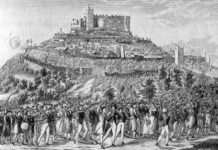
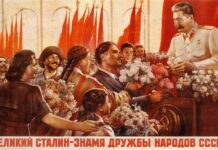













![Illustration to Robert Burns' poem Auld Lang Syne by J.M. Wright and Edward Scriven. The Complete Works of Robert Burns: Containing the Poems, Songs, and Correspondence. Illustrated By W.H. Bartlett, T. Allom, and Other Artists. With a New Life of the Poet, and Notices, Critical and Biographical[1] by Allan Cunningham. Published in London by George Virtue. No year is given explicitly, but "James Gibson 1856" has been handwritten inside the front cover, it's dedicated to a MP, Archibald Hastie of Paisley, who was no longer a MP by 1857, and some of the artists and engravers were dead before 1842. As such, I'm going with c. 1841 as the year, though it could be as late as 1856, when James Gibson evidently acquired. From: The Complete Works of Robert Burns: Containing the Poems, Songs, and Correspondence. Illustrated By W.H. Bartlett, T. Allom, and Other Artists. With a New Life of the Poet, and Notices, Critical and Biographical by Allan Cunningham, London: George Virtue. Drawn by John Masey Wright (1777–1866, artist), Engraved by John Rogers (c. 1808-c. 1888, engraver), Restored by Adam Cuerden (1979–, restorationist), Cropped by Beyond My Ken. Public Domain.](https://socbib.dk/wp-content/uploads/2018/02/John_Masey_Wright_-_John_Rogers_-_Robert_Burns_-_Auld_Lang_Syne_crop-100x70.jpg)
